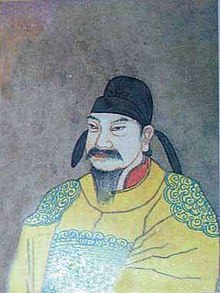
Back Emperador Yizong de Tang Catalan Tang Yizong Spanish Tang Yizong French 懿宗 (唐) Japanese 당 의종 Korean Tang Yizong Dutch Keiser Yizong av Tang NB И-цзун (династия Тан) Russian Tang Yizong Swedish จักรพรรดิถังยี่จง Thai
| Emperor Yizong of Tang 唐懿宗 | |||||||||||||||||
|---|---|---|---|---|---|---|---|---|---|---|---|---|---|---|---|---|---|
 | |||||||||||||||||
| Emperor of the Tang dynasty | |||||||||||||||||
| Reign | September 13, 859[1][2] – August 15, 873 | ||||||||||||||||
| Predecessor | Emperor Xuanzong | ||||||||||||||||
| Successor | Emperor Xizong | ||||||||||||||||
| Born | December 28, 833[1][2] | ||||||||||||||||
| Died | August 15, 873 (aged 39) [1][2] | ||||||||||||||||
| Burial | Jian Mausoleum (簡陵) | ||||||||||||||||
| Consorts | Empress Hui'an (died 866) Empress Gongxian (died 867) | ||||||||||||||||
| Issue | Li Yi Li Ting Li Ji Li Kan Emperor Xizong Li Bao Emperor Zhaozong Li Yi Princess Weiwenyi Princess Anhua Princess Changyuan Princess Changning Princess Jinhua Princess Renshou Princess Yongshou Princess Suining | ||||||||||||||||
| |||||||||||||||||
| House | Li | ||||||||||||||||
| Dynasty | Tang | ||||||||||||||||
| Father | Emperor Xuanzong | ||||||||||||||||
| Mother | Empress Yuanzhao | ||||||||||||||||
| Tang Yizong | |||||||
|---|---|---|---|---|---|---|---|
| Chinese | 唐懿宗 | ||||||
| Literal meaning | "Restrained Ancestor of the Tang" | ||||||
| |||||||
| Li Wen | |||||||
| Chinese | 李溫 | ||||||
| Literal meaning | (personal name) | ||||||
| |||||||
Emperor Yizong of Tang (December 28, 833 – August 15, 873), né Li Wen, later changed to Li Cui (Chinese: 李漼), was an emperor of the Tang dynasty of China. He reigned from 859 to 873. Emperor Yizong was the eldest son of Emperor Xuanzong. After Emperor Xuanzong's death in 859, Emperor Yizong was placed on the throne by the eunuch Wang Zongshi (王宗實), who killed other eunuchs supporting another son of Emperor Xuanzong, Li Zi the Prince of Kui.
According to traditional historians, Emperor Yizong did not pay much attention to governmental affairs but instead chose to live in opulence, became an alcoholic and surrounded himself with women while his government levied heavy taxes on its citizens. A deeply devout Buddhist, even more so than his father, he would hold grand Buddhist ceremonies throughout the year as well as ordering frequent musical performances in the palace. If the entertainment was to his liking, Yizong would not only reward the entertainers greatly but also bestow governmental ranks. Emperor Yizong eventually exhausted the empire's treasury that had accumulated during his father's administration. Extreme hardships, including famines that forced people to resort to cannibalism, led to widespread agrarian rebellions late in his reign. Those rebellions would plague the reign of his son Emperor Xizong.
- ^ a b c d e Academia Sinica Chinese-Western Calendar Converter Archived May 22, 2010, at the Wayback Machine.
- ^ a b c Old Book of Tang, vol. 19, part 1.
- ^ Zizhi Tongjian, vol. 250.
- ^ Zizhi Tongjian, vol. 252.
© MMXXIII Rich X Search. We shall prevail. All rights reserved. Rich X Search